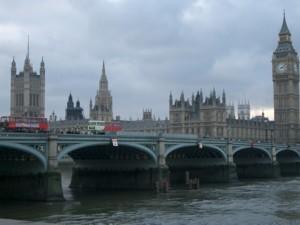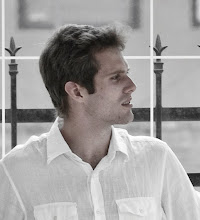
Despite a rather late entry into the game, I have finally got around to jumping on the cinema studies blogspot bandwagon, a prospering field thanks to the impressively furtive work by Jeff and Cullen this summer. My belated initiation is based on three extenuating factors: initial skepticism against the blog community, the past 6 weeks of the summer being spent out of the country and general laziness. Of course the latter being the main stumbling block but now that the first two excuses no longer hold water, I’ll be doing my best to overcome the always problematic tendency toward inactivity.
Today marks my first day back in America after 6 weeks spent in London studying British Cinema and Shakespeare, two fields I have come to revere greatly. At the program’s start it would have been a generous overstatement to say that I had a very limited background in Shakespeare, Macbeth being the only play I truly paid attention to during my regrettably apathetic high school years; although in my defense the curriculum was not overly supportive of the Bard. Fortunately I had a few filmic interpretations floating around the back of the memory bank to help access the plays, in addition to the ever trusty Sparknotes of course. It must be said that after doing the required extracurricular research to acquaint myself with the initially seeming impenetrable text, I found the material to be quite rewarding and important. If nothing else it has opened up so many more pop culture references. Take for example the scene in Reality Bites when Ethan Hawke answers the phone with “Hello, you’ve reached the winter of our discontent,” which I now know to originate from the opening line of Richard III (although I probably should have known that beforehand). Or the immortal lines from Rush’s 1981 rockin’ ode to celebrity, Limelight, where lead singer Geddy Lee liberally quotes As You Like It’s “All the world’s a stage/ and we are merely players.” Or better yet, all the interesting pieces of verse not instantly familiar to contemporary audiences.
“I am sure my love’s more ponderous than my tongue.” (King Lear)
“The shadow of your sorrow hath destroyed the shadow of your face.” (Richard II)
“Friendship is constant in all other things save the office and affairs of love.” (Much Ado About Nothing)
“I am a great eater of beef and I believe that does harm to my wit.” (Twelfth Night) or my personal favorite,
-“But what’s his offense?”
-“Groping for trouts in a peculiar river.” (Measure for Measure) – gropingtrout.blogspot.com being a close second for my blog title.
Switching over to the British Cinema class, a welcome return to film, as that is the ostensible aim of this blog. The screening list consisted of The 39 Steps (Hitchcock), A Canterbury Tale (Powell and Pressburger), Brief Encounter (David Lean), The Ladykillers (Alex Mackendrick), Billy Liar (John Schlesinger), Kes (Ken Loach), Life is Sweet (Mike Leigh), Four Weddings and a Funeral (Mike Newell), Trainspotting (Danny Boyle) and In This World (Michael Winterbottom). As you see, the list covers a wide gamut of the top British directors and I found all these films to be especially interesting, save Ladykillers which ran a little dark for my taste. Four Weddings and a Funeral being a perennial favorite of mine, I chose to write my paper on the fluffy subject of Richard Curtis penned romantic comedies, e.g. Bridget Jones’ Diary, Notting Hill and Love Actually. While this does not necessarily make for cutting edge, high art, cinematic study it was a subject close to my heart with plenty of previous research. A key factor as my access to film was rather restricted while being in London due to the different region encodings. With the overall film inaccessibility, the Shakespeare immersion and overall time required for soaking up London atmosphere, my movie watching took a great toll throughout the month of July. Although after the mad frenzy of film watching in May and June, this was a welcome reprieve. So while I slowly begin to catch up on outside movie watching and report on my findings, I’ll coast by for a few days posting archival material of papers written over the past two years of collegiate study, starting with the recent Richard Curtis dossier.
In the meantime I’ll begin with a brief summation of my London based cinema excursions. If you think going to the movies in New York is expensive, try London. Most tickets run somewhere between 6 pounds and 12 pounds, an exorbitant amount in itself but an absolutely ludicrous amount when converted to dollars. I knew I would have to choose wisely on my scarce theater trips. The lucky three films that I deemed worthy of my precious pounds were Wedding Crashers, The Skeleton Key and Mr. and Mrs. Smith. As you can see, I ignored my choosing wisely strategy. The one choice I make no concession about is Wedding Crashers. An enormous hit back in the states, the film cured any unwelcome thoughts of homesickness and gave me immediate conversation set-ups with friends back home. Owen Wilson’s style of humor has been a favorite of mine over the past few years and while I am not always an ardent Vince Vaughn fan (he sleepwalked through Dodgeball) his rapid-fire dialogue spewing can be very funny as long as it’s not overdone, i.e. Made. Thanks in large to its charismatic leads, Wedding Crashers proved to be raunchy summer fun despite the occasional foray into Meet the Parents apeing.
The Skeleton Key was my major misstep. I don’t completely regret the decision since it opened in London two weeks before America and the pre-release knowledge of the final product is always fun to flaunt at every trailer or poster opportunity. I was also tantalized by the credit, “From the writer of The Ring.” While some might scoff, I found The Ring to be one of the scarier and deeper horror films to come out in recent years so I figured Ehren Kruger should be reputable enough to make this worth a decent scare or two. Now I know to transfer all credit for The Ring to Gore Verbinski and any other member of the production crew aside from Kruger. His screenplay for The Skeleton Key is absolutely horrendous and lathers on obvious exposition scenes without mercy. The Kate Hudson character makes an exceptionally poor lead. She’s virtually the same character that Naomi Watts played but Hudson doesn’t have the charm to pull off the “determined to find out the truth” trait in spite of being a completely unlikable, abrasively confrontational jerk. The strong Peter Skarsgaard is also wasted behind a shaky southern drawl and lifeless screen time. The only actor who gets away unscathed is the prestigious John Hurt who wisely plays a stroke victim with no coherent lines of dialogue.
As for Mr. and Mrs. Smith, well what can I say, I couldn’t resist. I didn’t get the chance to see it before leaving America and I knew it wouldn’t be easy to see by the time I got returned so I figured why not. As luck would have it, I found it to be a light summer entertainment foray in the same spirit as Wedding Crashers. While it is noisy and excessively frenetic on the one hand; the off-beat humor, quirky casting decisions and tongue-in-cheek bravado pay off handsomely. While Doug Liman is certainly not portrayed to be the easiest director to work with, he sure seems to know how to sculpt an entertaining studio product that manages to remain safe while not appearing completely mindless. In this instance, he brilliantly turns the film into a romantic dilemma with a professional assassin background rather than vice versa. The relationship between the leads is given genuine weight and the action revolves around their inability to connect emotionally and the being hired to kill each other plot is merely a device to investigate their marital situation, a point brilliantly illustrated by the book-ending group therapy scenes. The frivolity with which the action plot is resolved, and by that I mean there is virtually no resolution, harkens back to Hitchcock’s The 39 Steps (thank you British Cinema) where the ludicrous Mr. Memory sub-plot is arguably just a means for the two lead characters to meet and fall in love. Even though there isn’t much connection between Liman’s Mr. and Mrs. Smith and Hitchcock’s Mr. and Mrs. Smith, I think there is room for an interesting investigation into Hitchcockian tendencies, mainly 39 Steps and North by Northwest, could be carried out quite fruitfully here. Then again this is a flashy summer blockbuster and it’s generally a safe assumption that explorations remain at surface level in these situations. Of course, I am no stranger to frothy examinations as my impending postings on the relevance of late ‘90s Gross-Out Comedies and the political and cultural undertones of Bill & Ted’s Excellent Adventure will make alarmingly clear.


No comments:
Post a Comment